#american injustice system.
Explore tagged Tumblr posts
Text
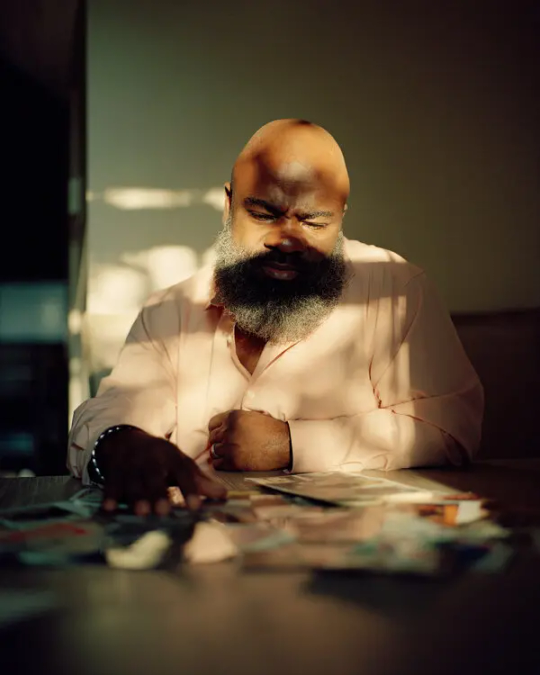
At age 17, Donnell Drinks was one of many young men in Philadelphia who went to prison for life without parole. Today, the city has resentenced more of those prisoners than any other jurisdiction.
Published Aug. 15, 2023Updated Aug. 18, 2023
Donnell Drinks woke up one morning to banging on his door in the projects of North Philadelphia. It was the late 1980s, and Mr. Drinks, who was 15 and the oldest of three boys, had nodded off after taking his youngest brother to school. He should have been at school himself, but he had stopped going earlier that year. It wasn’t a truant officer at his door, though — no one had ever come knocking about that. Instead, sheriff’s deputies were waiting outside. They were there to evict his family.
The officers told him to get out, not bothering to ask if there was an adult around, which there wasn’t. Mr. Drinks’s dad had abandoned the family a decade earlier, and his mom was in the throes of crack cocaine addiction. For years, Mr. Drinks had been raising his younger brothers, and he had just become a father himself. He’d dropped out of school to support his family by selling drugs, a transition that felt so natural he hardly remembered how it happened.
Groggy and panicked, Mr. Drinks scanned the apartment for essentials, stuffed a shopping cart with clothes for his brothers and wheeled the cart up the road to his grandmother’s overcrowded rowhouse. The officers never asked where he was going.
“There was not one adult that said, Hold a minute. We need to call somebody,” Mr. Drinks said. “Not one adult said, That’s a child.”
At the time, Black teenage boys like Mr. Drinks were being treated less as children in need of help and more as if they were threats to society itself. Crime was rising nationwide, particularly in Philadelphia, where, in 1990, the city recorded 500 murders in a year for the first time. It was a terrifying period, especially for people living in poorer neighborhoods where the violence was worst. But the rhetoric, perpetuated by public officials and overheated headlines, suggested that a new morally depraved generation of teenagers — particularly Black teenagers — were to blame. This idea gave rise to the “superpredator” era and a raft of laws cracking down on juveniles that followed.
Mr. Drinks, now 50 years old, is a small man with a stocky frame and a warm, gaptoothed smile. He keeps his salt-and-pepper beard meticulously fluffed. An animated storyteller who is quick with a metaphor and a motivational quote, he becomes guarded when describing his upbringing — not just because it’s painful, but because he doesn’t want anyone to think he’s trying to justify what happened next. “This is context,” he said, “not excuses.”
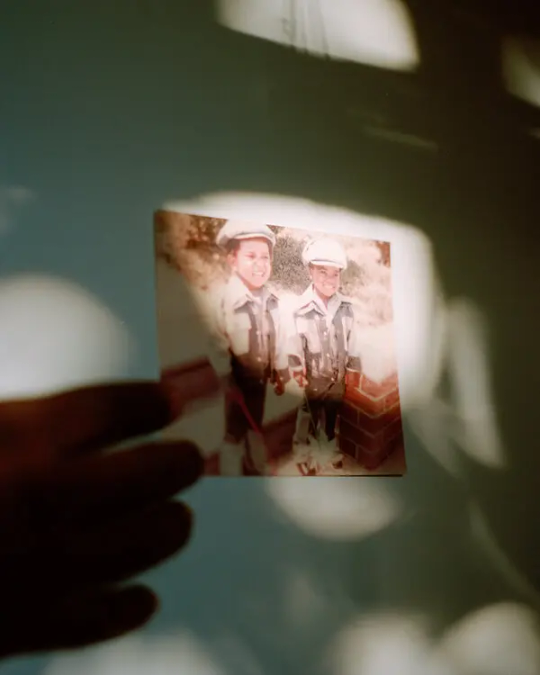
In February 1991, when he was 17, Mr. Drinks and his 22-year-old girlfriend, who was a police officer, tried to rob a man named Darryl Huntley. They staked out Mr. Huntley’s house and forced him and his fiancée inside at gunpoint. That violent act led to others. Mr. Drinks stabbed Mr. Huntley, fatally, and was shot himself. Mr. Drinks was arrested while he was in the hospital recovering from his injuries.
By the time Mr. Drinks was brought to trial for Mr. Huntley’s murder, Philadelphia had a new district attorney: Lynne Abraham, a former judge who went on to hold the office for nearly two decades. Pennsylvania law already made life sentences mandatory for first- and second-degree murder convictions, but Ms. Abraham responded to the era’s surge in violent crime by aggressively pursuing the death penalty, an approach that once earned her the moniker the “deadliest D.A.”
She also called for tougher punishments for juveniles. In 1994, she pushed for legislative changes to give prosecutors more power to charge juveniles as adults. “You don’t get any bonus for being under a certain age,” she told The Philadelphia Inquirer at the time. The next year, the state passed a law that required prosecutors to treat children 15 and older as adults when they were charged with certain crimes.
Though Philadelphia had already sentenced many young people to life without parole, under Ms. Abraham’s watch — and with the city’s murder rate remaining high throughout the ‘90s — the number getting that sentence in Philadelphia rose quickly. For some, it may have been a deal worth taking to avoid the death penalty.
Mr. Drinks was tried as an adult and initially sentenced to death. In 1993, his sentence was reduced to life without parole. (His then-girlfriend, who received the same sentence, remains in prison.)
He most likely would have died in prison, but while Mr. Drinks was behind bars, a national effort began to rethink the culpability of young people in the eyes of the law. In the 2005 case Roper v. Simmons, the Supreme Court struck down the death penalty for minors, leaning heavily on new scientific research that showed — “as any parent knows,” Justice Anthony Kennedy wrote — that young people are not like adults. They are more impulsive, reckless and susceptible to persuasion.
The court did not question that minors should pay for committing heinous crimes, but in banning the most severe punishment, it affirmed the possibility “that a minor’s character deficiencies will be reformed.” Real change, Justice Kennedy suggested, was possible.
Mr. Drinks had been in prison for more than a decade when the Roper decision came out. Then one day, a Philadelphia lawyer named Bradley Bridge traveled to the upstate Pennsylvania prison where Mr. Drinks was locked up, and explained to him and the other men who had been given life sentences as boys what the ruling could mean for them.
Striking down the death penalty for minors was only the beginning, Mr. Bridge said. Soon, he predicted, the court would apply the same logic to outlaw mandatory life sentences for juveniles too, potentially giving Mr. Drinks and others serving such sentences a shot at freedom — and giving the city of Philadelphia a chance to rewrite its legacy.
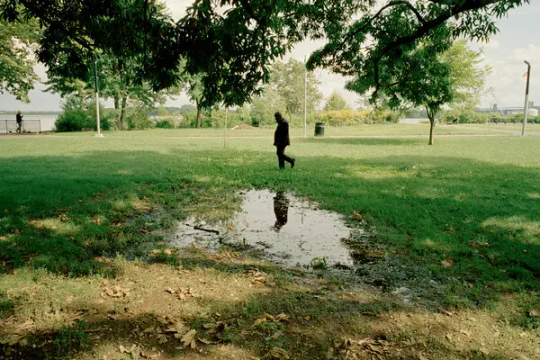
A long list of friends
Mr. Bridge had been delivering his speech inside prisons throughout Pennsylvania for months before Mr. Drinks heard him speak. Mr. Bridge worked for the Defender Association of Philadelphia and had spent nearly three decades representing prisoners who were appealing their sentences. When the Roper ruling came down, he was involved in the case of a teenager facing a mandatory sentence of life without parole. He understood immediately the opportunity that the Supreme Court’s ruling presented not just for his client, but for scores of prisoners.
For Mr. Bridge, it meant pursuing a novel legal theory that might help dismantle what he viewed as a particularly unjust part of the justice system. “Children are children, and they make mistakes,” Mr. Bridge said. “But they grow and change.”
Mr. Bridge began the enormous undertaking of compiling a list of all the prisoners in Pennsylvania who were sentenced to life as minors. No one in the state had ever kept track of this group, who came to be called “juvenile lifers” in the courts and “child lifers” by some of the inmates themselves.
He expected the list to be long. He didn’t expect it to eventually include more than 500 names, nearly one-fifth of the more than 2,800 child lifers in the country. More than 300 of them had come through Philadelphia’s system, making a city with less than 1 percent of the country’s population responsible for more than 10 percent of all children sentenced to life in prison without parole in the United States. No other city compared. Even more glaring: More than 80 percent of Philadelphia’s child lifers were Black. Nationally, that figure was roughly 60 percent.
Racism “undoubtedly occurred in every phase of the criminal justice system,” Mr. Bridge said. “This created an opportunity to try to fix things that had been broken.”

After the Supreme Court outlawed the death penalty for minors, Bradley Bridge started encouraging inmates sentenced to life as children to prepare for the possibility that the court would eventually revisit the constitutionality of their sentences, too.
His partner in this work was Marsha Levick, who had co-founded the Juvenile Law Center in 1975 as an idealistic young graduate of Temple University’s law school and gone on to become one of the nation’s foremost experts on juvenile sentencing.
Mr. Bridge and Ms. Levick began traveling the state, arranging meetings with the people on Mr. Bridge’s list and adding names as they went. Mr. Bridge’s first stop was Graterford, a maximum-security facility outside of Philadelphia that, at the time, held more child lifers than any prison in the state. Dozens of men crowded into Graterford’s chapel to hear what Mr. Bridge had to say.
“People wanted to know what was coming down the pike,” remembered Kempis “Ghani” Songster, who was in the room that day. “Is this a ray of light flickering on?”
At age 15, Mr. Songster stabbed another teenager to death in a crack house. Both were runaways working for the same gang. He was given a life sentence for his crime, but it wasn’t until that meeting in 2006, nearly two decades after he went to prison as a scrawny kid who couldn’t grow a beard, that he realized how many other lifers at Graterford had also arrived as teenagers.
“It was like, Whoa, he’s been here since he was a kid, too?” Mr. Songster said. “A lot of us who were child lifers didn’t really know that we were in a distinct class.”
There had never been a reason to talk about age. The courts had treated them as adults, and if anything, being marked as a child in a violent adult prison would only have made them more vulnerable. Now, there was power in the identity.
The child lifers inside Graterford began organizing. They quickly formed a committee called Juvenile Lifers for Justice, which met weekly to discuss the evolving law and science around adolescent development. They drafted pamphlets, circulated newsletters to other prisons and their family members, and kept one another motivated around their common cause.
These conversations also started to change how some of the men thought about why they had committed such serious crimes.
Mr. Songster said he never felt “entitled” to be free. “I can’t wash the blood off my hands that’s on my hands,” he said. But the emerging research, which showed brains aren’t fully developed until people get into their 20s, gave him new understanding. “It made me curious about myself,” Mr. Songster said of the research. “I knew I was a good person, but I couldn’t reconcile the person that I became and I know I am with the person that committed that horrible act.”
The child lifers were also reaching out beyond the prison walls. They invited politicians to visit Graterford and partnered with nonprofit organizations to distribute supplies to local schools.
“We were always trying to break that wall down so people could see we’re humans,” said Don Jones, who was also sentenced as a minor and was the president of Graterford’s N.A.A.C.P. chapter during this period.

Mr. Bridge and Ms. Levick became frequent fixtures at the prison. At each of these visits, Ms. Levick was struck by how the men — imprisoned at such a young age and last in line for any prison edification programs because of their status as lifers — had mastered the nuances of the law and were orchestrating a statewide grass-roots movement from inside prison. “Their desire to come home was real,” Ms. Levick said. “It was palpable, and it made you want to do more.”
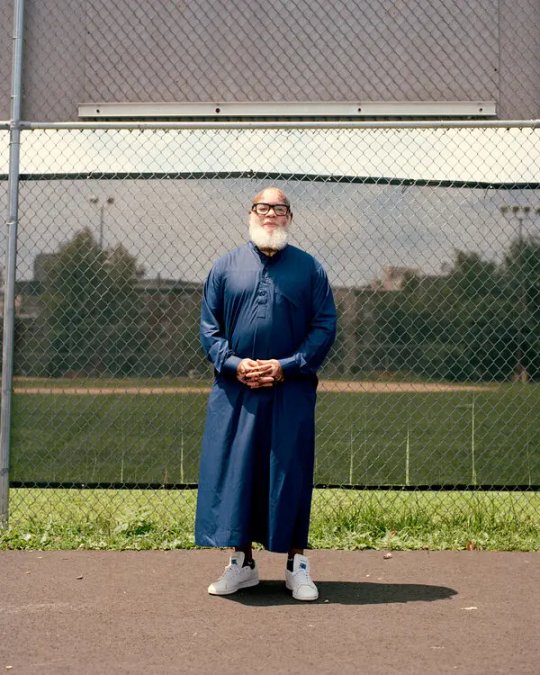
“We were always trying to break that wall down so people could see we’re humans,” said Don Jones, who was locked up at Graterford and has since been released.
Mr. Drinks had spent 10 years at Graterford, but after he was transferred upstate, newsletters coming out of Graterford and messages passed along from old friends became his lifeline. Without a lawyer of his own, he kept his case alive by adapting draft legal petitions circulated by Mr. Bridge. And he documented his accomplishments in prison — articles he’d written, certificates he’d earned, thank-you notes from the nonprofits he’d raised money for — until he had three manila envelopes’ worth of records illustrating all the ways he’d grown.
Still, he never quite let himself believe that Mr. Bridge’s prediction would pan out. He wanted to be prepared, but he was also prepared to be let down.
“It’s like throwing water out of a boat that’s sinking,” Mr. Drinks said. “You’ve got to do it anyway, because if you don’t, the water’s going to get you.”
Throughout this period, lawyers around the country, including Ms. Levick and Mr. Bridge, were bringing new cases, trying to apply the rationale in the Roper ruling to other kinds of sentences for juveniles. At the national level, a key leader in this work was Bryan Stevenson, founder and executive director of the Equal Justice Initiative, a nonprofit.
Mr. Stevenson saw a connection between the superpredator era and the overwhelming number of young Black boys who had been locked away for life.
“You had these criminologists going around saying that some children aren’t children. Some kids look like kids, but they’re really, quote, superpredators,” he said. “That narrative was so prevalent, so persuasive, that you see states all over the country lowering the minimum age for trying children as adults.”
In 2008, the Equal Justice Initiative found 73 children who had been given sentences of life without parole when they were 13 and 14 years old. And all of the people who received those sentences for crimes other than homicide were children of color.
“It just said something about the way in which race was a proxy for a presumption of dangerousness, this presumption of irredeemability,” Mr. Stevenson said.
Then came a series of breakthroughs. In 2010, the Supreme Court abolished sentences of life without parole for minors charged with crimes other than murder. Two years after that, Mr. Stevenson appeared before the court on behalf of two young men who were sentenced to life without parole when they were 14. In its decision in Miller v. Alabama, the Supreme Court struck down all mandatory sentences of life without parole for juveniles. Four years later, in a case called Montgomery v. Louisiana, for which Ms. Levick served as co-counsel, the court made that decision retroactive, fulfilling the prediction Mr. Bridge made in the Graterford chapel a decade before, and giving more than 2,800 child lifers across the country the right to have their sentences revisited.
Mr. Drinks remembers the first time he got a look at Mr. Bridge’s list. It was filled with the names of people he’d known for years, but had never known were child lifers. There was Abd’Allah Lateef, the soft-spoken guy he’d always admired at Graterford, even when he griped about Mr. Drinks’s loud music. There was Luis “Suave” Gonzalez, a big talker whom Mr. Drinks had encouraged to lead one of Graterford’s Latin American cultural exchange groups. And there was Don Jones, a friend so close, Mr. Drinks said, “my brothers call him brother.”
“That was my tear-shed moment,” Mr. Drinks said. “I knew I was on the list, but going down the list and seeing genuine friends?” Now, they might all have a shot at freedom — a shot, but not a guarantee.
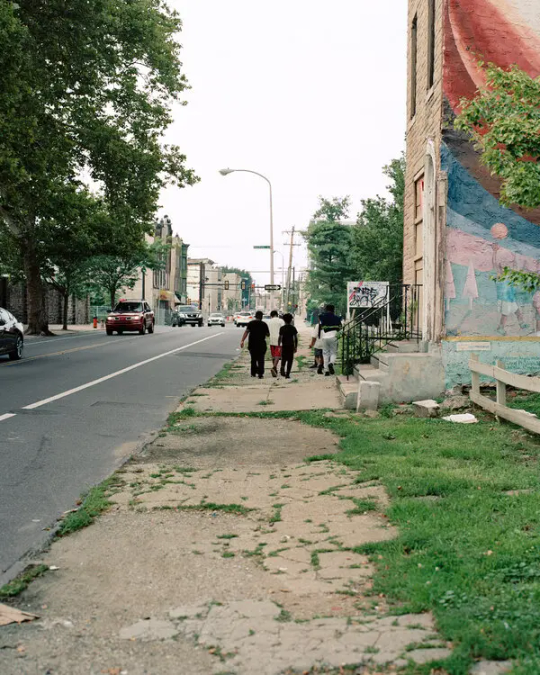
A block in North Philadelphia. Donnell Drinks sold drugs in the area as a teenager and was convicted of homicide at age 17 in a robbery gone wrong.
‘The election changed everything’
The Supreme Court’s rulings in Millerand Montgomery marked an important rethinking of culpability when it comes to children who commit the most serious crimes. But the practical implications of the rulings were limited: the court hadn’t abolished all life without parole sentences for children — only ones where state laws made the sentences mandatory.And while child lifers now had a chance to make a case for their release, prosecutors could still seek new life sentences. In other states with high numbers of child lifers, including Michigan and Louisiana, as well as some parts of Pennsylvania, that’s just what they did.
In Philadelphia, however, all of the list-gathering and planning that had been taking place for more than a decade began to pay off. Most of the state’s child lifers had been prosecuted in the city, and it was up to its district attorney’s office and court system to move hundreds of people through the resentencing process. “Philadelphia was bad, and everybody recognized it was bad,” Mr. Bridge said.
Ms. Levick added, “In a way, the whole world was watching.”
Philadelphia soon began resentencing and releasing child lifers, starting with those who’d been in prison the longest. But while R. Seth Williams, Philadelphia’s district attorney, initially committed not to resentence anyone to life without parole, he stuck to strict new state sentencing guidelines, which meant that Mr. Drinks and others who had been swept up in the ’90s, would most likely spend many more years in prison.
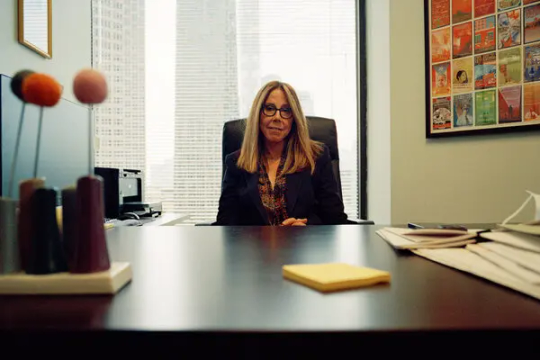
Marsha Levick, an expert on juvenile sentencing, visited inmates. “Their desire to come home was real,” Ms. Levick said. “It was palpable, and it made you want to do more.”
Mr. Williams viewed this approach as the only way to honor the Supreme Court’s ruling, the Pennsylvania government’s consensus and the rights of the victims. “People often only look at the factors for the defendant. I understand. But they often forget there was a victim,” Mr. Williams said. “Someone was murdered. We just can’t just sweep that under the rug.”
Then came a twist that no one predicted. In March 2017, a little over a year after the Montgomery decision, Mr. Williams was indicted on charges including bribery and extortion and later sentenced to five years in prison. Almost as surprising was who was elected to be his successor: a sharp-elbowed former public defender and criminal defense attorney named Larry Krasner.
Whatever Ms. Abraham, the former district attorney, had been to the city in the 1990s, Mr. Krasner swore to be the opposite. (Ms. Abraham did not respond to requests for comment.) He had run against the death penalty and mass incarceration, and vowed to decriminalize marijuana and end cash bail. One of his first moves after taking office in January 2018 was to fire 31 prosecutors in a purge that became known as the Snow Day Massacre.
When it came to juvenile lifers, Mr. Krasner was more open than his predecessor to considering how people had changed in the decades since committing their crimes. Chesley Lightsey is a former assistant district attorney who worked on Mr. Drinks’s case and others under both administrations. “It took time for me to wrap my head around it: ‘Okay, now we can have much more of a conversation about this,’” she said about the change when Krasner was elected. “It was just a different perspective.”
Under Mr. Krasner, prosecutors paid special attention to reports drafted by mitigation specialists. Those specialists, who are essentially professional storytellers for defendants, interviewed juvenile lifers, their families and anyone else who could offer context. They asked questions about how the inmates had been raised, the trauma and pain that had influenced their actions, what they had done with their time in prison and what they planned to do upon release.
By the time Mr. Krasner took office in January 2018, Mr. Drinks had spent hours spilling his soul to a lawyer and mitigator named Rachel Miller. Over the course of countless calls and several in-person visits, Ms. Miller wove the story of Mr. Drinks’s life into a memo, complete with a two-inch stack of documents highlighting his accomplishments.
The memo covers the most painful moments of Mr. Drinks’s childhood: being abandoned by his father, his mother’s struggle with addiction, getting evicted. It describes how Mr. Drinks would skip school to collect the family’s food stamps before his mother could pawn them for drugs and how, when his mother turned violent, he would take the brunt of her beatings in an attempt to spare his brothers.
But the memo also tells the story of a grown man who spent his time behind bars trying to atone for the crime that put him there. Among the stack of documents is a community college transcript filled with A’s and B’s, an agenda for a workshop he organized with victims’ rights advocates and a photo of him beaming behind a giant check made out to Big Brothers Big Sisters of America. Perhaps most meaningful to Mr. Drinks were the letters he received from other incarcerated men who were members of a youth group he founded attesting to all the ways the group, and Mr. Drinks, had saved them. “I did not know the child that committed the crime he is in here for,” read one of the letters, “but the man I do know is not that same person.”
Before Mr. Krasner’s election, Mr. Drinks was offered a deal of 35 years to life, which would have made him eligible for parole in 2026. Shortly after Mr. Krasner took over in 2018, Mr. Drinks got a new offer: time served.
“The election changed everything,” Mr. Drinks said, referring to Mr. Krasner’s victory.
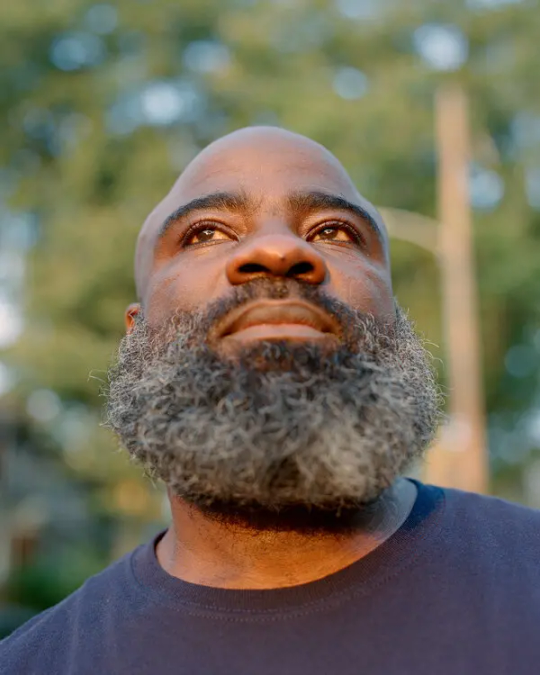
“I’m always conscious of the emotion, the hurt, the disappointment, the disdain, all those negative emotions that my actions led to,” Mr. Drinks said of the murder he committed. “I’ve got to live the rest of my life counteracting that.”
Mr. Drinks’s case was not unique. Researchers at Montclair State University have found that, under Mr. Krasner, prosecutors began offering child lifers new sentences that were, on average, 11 years shorter than the ones offered to those same people under Mr. Williams. Crucially, the researchers found that child lifers’ release had a negligible effect on public safety. Seven years after they started coming home, the rearrest rate for Philadelphia’s child lifers hovers around 5 percent. That’s small compared with the national rate, where 40 percent of people with past murder convictions are rearrested within the first five years, according to the most recent data from the Bureau of Justice Statistics. As of early this year, only three of the city’s child lifers who were rearrested have been convicted (for marijuana possession, contempt and robbery in the third degree), according to the Montclair State researchers.
For Mr. Krasner, these numbers reveal as a lie the idea that some people are so incapable of change that they should never be offered a shot at it. “It was always wrong to believe that people are either saints or they’re sinners,” Mr. Krasner said.
At his resentencing hearing in April 2018, Mr. Drinks read aloud from a letter before a gallery filled with friends and family, as well as the loved ones of Mr. Huntley, his victim. He apologized to Mr. Huntley’s family and said he knew he had no right to ask anyone in the room for forgiveness, and so he didn’t. But he did promise to spend the rest of his life making amends.
Mr. Huntley’s family members also made statements to the court. In a handwritten letter, Mr. Huntley’s sister described her brother as a loving and giving person. She explained how his murder had crushed her family, derailed her own education and deprived her children of ever knowing their uncle. “My mother still is deeply hurt and our family find it difficult to celebrate Valentine’s Day,” she wrote, “because these horrible, horrible actions took place that evening leading into his death.” She told the court that she did not want to see Mr. Drinks released.
Mr. Huntley’s sister did not respond to an interview request, but Suzanne Estrella, who runs the Office of Victim Advocate in Pennsylvania, said that many victims’ families “flat-out just do not” agree with the resentencings. But she said there were also many families that understood and accepted them. “You have survivors who have lost loved ones and survivors who have loved ones who are incarcerated,” Ms. Estrella said. “So you see all those perspectives coming to the table at the same time.”
As painful as it was, Mr. Drinks said he appreciated Mr. Huntley’s family’s honesty. “I felt it, and I understood it,” he said. “I’m always conscious of the emotion, the hurt, the disappointment, the disdain, all those negative emotions that my actions led to. I’ve got to live the rest of my life counteracting that.”
Three months after the hearing, having won the approval of the parole board, Mr. Drinks met his brothers as he walked out of prison for the first time in nearly three decades. Mr. Drinks remembers his sense of disbelief and being a little carsick as they drove the four hours back to Philadelphia, where he would move in with his brother Damon. The whole way home, he couldn’t shake the feeling that someone was following close behind. “I didn’t want to look back,” he said, “so I kept looking ahead.”
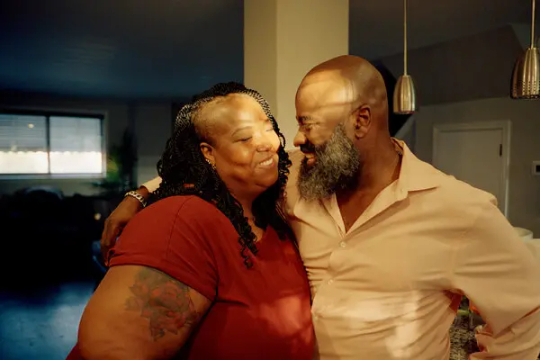
Donnell Drinks married Shekia Drinks two years ago. But he hasn’t been able to get the approval needed to move out of his brother’s home and in with his wife.
A return to the 1990s?
Of the more than 300 child lifers who became eligible for resentencing in Philadelphia in 2016, all but about a dozen have been resentenced, and more than 220 have been released, the majority of them on lifetime parole. That’s nearly a quarter of the roughly 1,000 total child lifers who have been released across the country. These numbers make Philadelphia, once an outlier in imprisoning minors for life, now an outlier in letting them go. By 2020, the city had resentenced more child lifers than Michigan and Louisiana combined.
What set the city apart, said Mr. Stevenson, of the Equal Justice Initiative, was not just the buy-in from local officials and public defenders, but also the community of child lifers who became their own best argument for release.
“It was the way they organized, the way they cared for one another, the way they modeled a kind of readiness to contribute to society,” Mr. Stevenson said. “These young people had been told they were going to die in prison. Some of them just never accepted that.”
Since the Supreme Court decisions, more than half of all states have outlawed life without parole sentences for children altogether, reducing the number of child lifers left in the country to fewer than 600, according to the Campaign for the Fair Sentencing of Youth, a national nonprofit. Mr. Stevenson’s organization is now working to raise the minimum age at which children can be tried as adults in 11 states, including Pennsylvania, where there is no age floor. Other states are considering abolishing mandatory life without parole sentences for people under 21.
While life without the possibility of parole sentences for juveniles are now rare, they are not unheard of. The now solidly conservative Supreme Court has issued a ruling that could lower the bar for judges to apply the sentence to children in states where it is still allowed. A prosecutor in Oakland County, Mich., is seeking life without parole for a mass shooter who was 15 when he killed four students at his high school in 2021. A judge will have to weigh the horror of his crime against the possibility that, over time, he could change.
The United States is still the only country in the world that gives courts the discretion to send children to prison without the chance of proving themselves later in life at a parole hearing. And the tough-on-crime rhetoric of the 1990s is making a comeback, thanks to a spike in violent crime that began at the outset of the pandemic. In Philadelphia alone, the murder rate has surpassed the record set in 1990 two years in a row, with young people emerging as both victims and perpetrators.
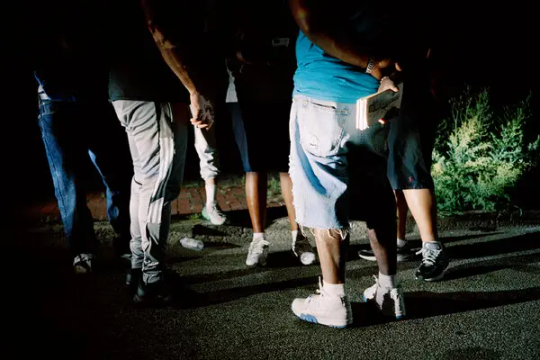
Mr. Drinks and Mr. Jones started an anti-violence group in Philadelphia and sometimes walk the streets handing out pamphlets.
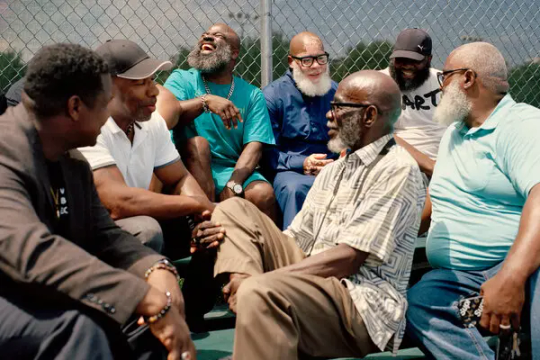
Just as they did in prison, child lifers have come together to create a buffer against an outside world that often feels hostile and unwelcoming.
Though this uptick in crime is showing signs of decline, it has prompted a nationwide backlash against progressive prosecutors, including Mr. Krasner, whose comparatively lenient approach has become a lightning rod in local politics. Mr. Krasner was recently the subject of an impeachment effort by Pennsylvania Republicans, and even some Democrats raced to condemn his record during the city’s mayoral primary in May.
Those who were released have become some of the loudest voices for building upon the fragile gains they fought for while on the inside. Their fight now is about abolishing life without parole for everyone, getting young people out of adult prisons and addressing the underlying causes of the violence plaguing Philadelphia and other major cities.
“If you would have dealt with a lot of my issues,” Mr. Drinks said, “they probably would not have escalated to crime.”
It’s not that Mr. Drinks and his fellow activists believe juveniles convicted of murder should not be held accountable. “When we talk to legislators, we don’t say: Throw the doors open, and everybody’s coming home,” Mr. Drinks said. “Our conversation is always that everybody deserves an opportunity to show they’re worthy of coming home.”
Today, Mr. Drinks coordinates a network of former child lifers through the Campaign for the Fair Sentencing of Youth. In any given week, he might be found with two cellphones in hand, flying to Alabama to urge progressive prosecutors to stay the course, organizing retreats for formerly incarcerated men and women, or canvassing city streets through an anti-violence nonprofit he co-founded with Mr. Jones, his friend from Graterford.
Mr. Drinks and other child lifers know that they embody for the public what all the research said about a young person’s capacity for change, and they are keenly aware that their example could help secure other people’s freedom. But they are also wary of being used to suggest that the system works, or allowing it to conceal just how difficult their re-entry into the outside world has been.
While several of Philadelphia’s child lifers have gone on to become an Ivy League lecturer or nonprofit executive, many more are working minimum-wage jobs or are unable to find work. Some are in bad health. Four have died. Nearly all of them are on lifetime parole, with the possibility of being sent back to prison forever looming.
Mr. Drinks credits his brothers, Damon and Kareem, for making his homecoming easier. Throughout Mr. Drinks’s incarceration, the three brothers had remained as close as the prison system would allow, keeping up visits even when he was transferred far away. Often, Damon Drinks would bring along Mr. Drinks’s son, who was just 3 when his father was arrested, and is now a grown man with a family of his own. It is thanks to his brothers, Mr. Drinks says, that he was able to maintain a relationship with his son at all.
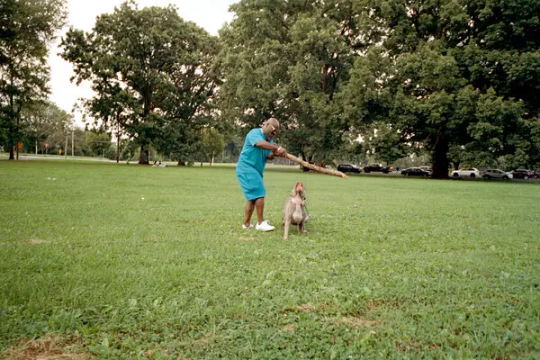
Mr. Drinks, in Fairmount Park, said his brothers visited him while he was in prison and have helped him readjust to life on the outside.
Damon and Kareem Drinks’s support continued once their big brother was released. They took him shopping, kept him housed and partnered with him to start a local printing company not far from the city courthouse. Mr. Drinks has not had to struggle to survive, but that doesn’t mean he has not struggled. Five years after he left prison, the terms of his parole still prohibit him from leaving the county of Philadelphia without permission. He got married two years ago, but he has yet to get the approval needed to move out of his brother’s home and in with his wife. And he lives with the constant fear that one act of violence by any of the state’s other child lifers could spell the end of his own tenuous freedom.
This fear is part of what keeps Mr. Drinks connected to the men who were once boys with him on the inside. Just as they did in prison, child lifers have come together to create a buffer against an outside world that often feels hostile and unwelcoming. These bonds are as much a product of their shared experiences as they are a defense against their shared vulnerabilities.
“We’re each other’s co-defendants,” Mr. Drinks said. “We see people want to stray, it’s like, No, come on. We’re going to get to this finish line together.”
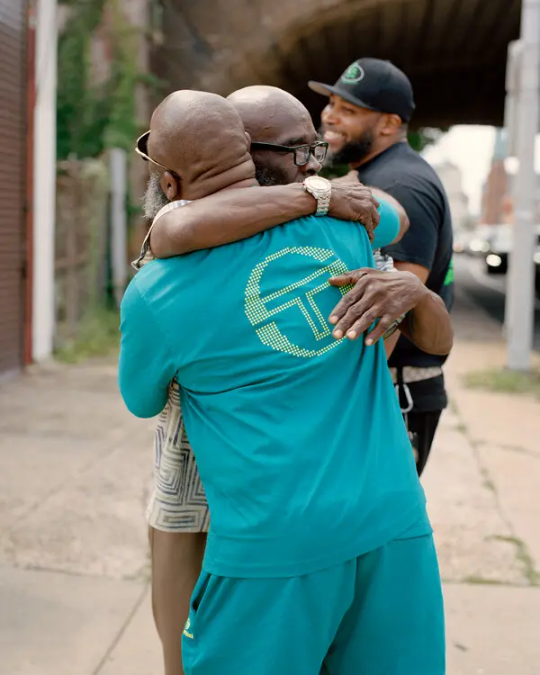
Mr. Drinks hugs Michael “Smokey” Wilson, another former child lifer.
#How People Sentenced to Life in Prison Made Their Case for Release#prison#american injustice system.#penal injustice#sentencing disparities#adultification#Black Lives Matter
65 notes
·
View notes
Text
The thing about Thank Goodness is that Glinda truly would be happy in this life if she had Elphaba there. It's very "this is almost perfect! but I wish Elphie was able to live this life with us too." Wheras for Fiyero, he can't live this life BECAUSE it's one that would demonize Elphaba, even if they forgave her. Glinda is happy to work within the current system and fix it, whereas Fiyero can't reconcile working for a system that is actively cleansing Animals and ostracizing/making an enemy out of Elphaba for opposing them.
#no hate to these people but when there's aus where gelphie live happy ever after and elphaba#becomes an Animal rights lawyer#that's glinda's dream! that's her vision!#playing wack a mole with systemic injustice while politicians struggle to gain inches of change#glinda my beloved american liberal#gliyero#wicked#wicked meta#wicked musical#glinda#fiyero#glinda upland#fiyero tigelaar#thank goodness wicked
25 notes
·
View notes
Text
hello everyone!

I want to talk about Marcellus Williams, also known as Khaliifah, who is scheduled to be executed in Missouri on September 24th for a crime DNA proves that he did not commit. There are several glaring injustices surrounding his conviction, including mishandling of evidence.
BACKGROUND: Marcellus "Khaliifah" Williams was sentenced to death for the tragic 1998 murder of Felicia Gayle, who was stabbed to death in her own home. The perpetrator left considerable forensic evidence at the crime scene, none of which matched Mr Williams. The prosecution case was based entirely on the unreliable testimony of two witnesses who were incentivised by promises of leniency in their own pending criminal cases and reward money. Neither of them provided new information, and their accounts conflicted with each other, their own prior statements and also crime scene evidence. They could also not be independently verified. In 2015, Missouri Supreme Court stayed Mr Williams' execution and appointed a special master to review DNA testing.
THE TESTING SHOWED THAT MR WILLIAMS WAS NOT THE SOURCE OF MALE DNA FOUND ON THE MURDER WEAPON. Nonetheless, in 2017, the special master sent the case back to the Missouri Supreme Court, who then rescheduled the execution WITHOUT CONSIDERING THE DNA TESTING. The then Governor, Eric Greitens, stayed the execution AFTER Mr Williams' last meal, and convened a board of inquiry to investigate the case. Under Missouri law, the stay of execution was to remain in place until the board of inquiry concluded its review and issued a formal report. EVEN SO, the current Governor Mike Parson, without warning or notice, DISSOLVED THE BOARD WITHOUT REPORT OR RECOMMENDATION WHILE THE INQUIRY WAS STILL GOING. The Attorney General Andrew Bailey then sought a new execution date. Mr Williams attempts to sue Governor Parson for violation of the law and his constitutional rights, but the lawsuit is dismissed in June 2024. The execution is set for September.
MISHANDLING OF EVIDENCE: In January 2024 there was more movement with the case as St Louis County prosecuting attorney Wesley Bell concluded Mr Williams was innocent (due to the DNA evidence) and moved to vacate his conviction. The findings of three independent DNA experts was reviewed, again, all three of them concluding that Mr Williams' DNA was not on the murder weapon. Sickeningly, it has also been found that there was CONSIDERABLE MISHANDLING OF FORENSIC EVIDENCE. The office of Attorney General Andrew Bailey himself stated that the knife used to kill Ms Gayle had “been handled by many actors, including law enforcement", and FOR THIS REASON, Mr Williams could not be exonerated! There was also DNA from an investigator for the prosecutor’s office at the time of Williams’ trial, and the prosecutor who handled the case could also not be excluded. In fact, that prosecutor stated that HE TOUCHED THE KNIFE AT LEAST FIVE TIMES WHILE NOT WEARING GLOVES! To Attorney General Bailey, it seems that this heinous miscarriage of justice is more reason to execute Marcellus Williams rather than exonerate him.
RACIAL BIAS WHEN SELECTING JURY: Another injustice in the Marcellus Williams case was the selection of a mostly white jury: eleven white jurors to one Black juror. This was not a coincidence - Keith Larner, the assistant prosecutor during the 2001 trial, removed six of seven qualified potential Black jurors, including one because he thought he looked like Mr Williams. Mr Larner was questioned about this in the recent hearing, and Kansas City Star reports, "They looked like brothers — familial brothers, not Black brothers, Larner tried to clarify." Furthermore, one prospective Black juror was not selected because he worked for the Post Office, and postal workers, according to the prosecutor, tend to be "very liberal". Nonetheless, he still approved a white post office worker for the jury. The jury took less than two hours (including lunch) to decide to sentence Marcellus Williams to death.
what you can do to help is sign the petition, talk about this, and share! save an innocent man’s life.
text is copied from this person! please retweet and like this post :)
#important#marcellus williams#black lives matter#death penalty#injustice#american#america#america justice system#justice system#please reblog#please please read this#innocence project#innocent victims#innocence#pokemon#mario#nintendo#kirby#artist on tumblr#queer community#lgbtqia#cats of tumblr#cats#uni the cat#inanimate insanity#object shows#gay#trans
11 notes
·
View notes
Text

okay class i may not know lots of context of the american history but isn't it an insane thing to say to a native american character
#i remember reading somewhere that at first janeway's holoplays were supposed to be of her roleplaying pioneer woman??? as in a parallel to#the first female captain?????? which is um?????????#i do love j/c i really do but sometimes it is just?????#like i cant speak on native americans experiences in ANY way but as a person who did experience oppression and life under occupation#i cant wrap my head around getting with someone who would support an unjust peace treaty with my oppressor. which i assume that she did bc#she was okay with capturing maquis???#chakotay is so so interesting to me especially because of the fact that he worked so hard to get into federation and statfleet but threw it#all when he saw injustice against his homeland. damn i wish they explained his inner turmoil of having to work in this system again#probs a good thing that they never did bc almost everything about how they handled maquis pisses me off. 'it is all about getting together#despite our differences <3' yeah i wonder why they were fighting in the first place#my post#please let me distract myself with something in peace without thinking about it too much 😔
4 notes
·
View notes
Text
The Evolution of American Historical Education: From Baby Boomers to the 1776 Commission
In recent history, American educational practices have undergone significant transformations, particularly reflecting the ideological shifts of various generations. The baby boomer generation, those born approximately between 1946 and 1964, received education under a traditional paradigm that prioritized a particular narrative of American history. This narrative was deeply rooted in the…
#1776 Commission#250th anniversary#American history#American Values#Baby Boomers#Civil Rights#college campus activism#Constitution#critical perspective#cultural conversation#curriculum reform#Declaration of Independence#educational evolution#educational policy#historical education#historical narrative#historical reflection#identity#national pride#patriotism#President Trump#systemic injustice#traditional education#Vietnam War
0 notes
Text
How Leonard Peltier’s Case Exposes a Broken System and Why It Must End Now
By Donald “C-Note” Hooker For nearly 50 years, Leonard Peltier has languished behind bars, his case a glaring example of a broken system that prioritizes punishment over fairness. At 80 years old, Peltier continues to endure the consequences of a deeply flawed trial riddled with suppressed evidence, coerced testimony, and prosecutorial misconduct. His imprisonment has become a symbol of how the…

View On WordPress
#Leonard Peltier#Native American rights#parole board abuse#systemic injustice#unauthorized quasi-executions
1 note
·
View note
Text
Welcome to High School
Slight TW: mention of suicide/gun violence
Welcome to the halls of hell,
Middle school sucked ass,
high school:
sucks balls, dick, and ass
all while asking you to complete a 2500 word essay, read sections 3-7, do problems 1-49, and finish a group project,
all by tomorrow.
Rambunctious boys prowl the hallways, you are not safe from them in class, the teachers gave up controlling them years ago.
gossiping girls hear everything, giggling at your suffering behind their manicured nails, they are not your friends, not unless they want something from you.
there is no sanity to be found within these corridors,
only the cries of the damned.
Mental stability checked out years ago,
and any you miraculously held on to is stripped by the metal detectors at the doors.
you need to be aware, every minute of everyday that you are in this building:
you are not safe.
Freshmen orientation may have made this place look fun,
like it was an upgrade from the immature antics of prepubescent children,
but don't let their fake smiles fool you,
we are all dead inside.
waiting for the day we are finally freed with the final bell of graduation.
some of us won't make it,
we all are aware of this,
whether it's failing grades or suicide:
we are not all walking the stage.
But I will, somehow, by some miracle, by the blood, sweat, tears, and caffeine I made it through.
and now, I pass my warning on,
to the next incoming freshmen.
"Welcome to high school, try and cling on to any hope you have left."
#poetry#slam poetry#american school system#gun violence#I wrote this a while ago#I got angry at the injustice of the public school system again#mental health
1 note
·
View note
Text


Never Forget, Kalief Browder (May 25, 1993 – June 6, 2015) who was held at the Rikers Island jail complex, without trial, for allegedly stealing a backpack, between 2010 and 2013 when his family was unable to make bail; he was in solitary confinement for two of these years! Rest in Paradise.
#pan africanism#black#black people#black history#black tumblr#black empowering#black power#blacktumblr#black conscious#africa#blacl American#black man#injustice#the system is fucked#Kalief Browder#kalief#browder#rikers island
594 notes
·
View notes
Text
The strongest theme of The Pitt for me is how nothing is how the public expects it. You think you know how unhoused people look like? No, he can be a fourth year med student doing his best. CSA survivor with a best friend who committed suicide? she's the meanest R1 who is not letting injustice slide and gets so excited about every procedure. The addict and the woman going through a miscarriage are the most competent senior residents you've ever seen. The attending saving the day at the last minute is an amputee.
Noah Wyles and his team really said "Nothing in ER departments is how it's supposed to be from the 12-hour wait times to the lack of blood, but people going through what would be anybody else's worst day are the only thing keeping the american healthcare system together"
#The Pitt#and i think that's beautiful#denis whitaker#trinity santos#heather collins#frank langdon#john abbott
3K notes
·
View notes
Text
To love me better
Tags: Yakuza Lord!Sukuna x fem!Reader, american!Reader, forced/arranged marriage, dark romance trope, dead dove, age gap romance (reader is around 21-22, Sukuna is 37) heavy dacryphilia, finger sucking, use of “good girl”, use of pet names, Sukuna is his own warning.
Synopsis: Yakuza Lord!Sukuna owns all of entertainment district. You’re trying to work to put yourself through law school. He has a proposition for you, and you have one for him.
An: I fear that I was going to explode if I didn’t write this. I’ve been in a not good headspace. Blah blah blah school sucks blah blah work sucks blah everything sucks. I’m sorry if this sucks too. Edit - I forgot to mention that this will be a multi-part fic.
Part one. | Part two.
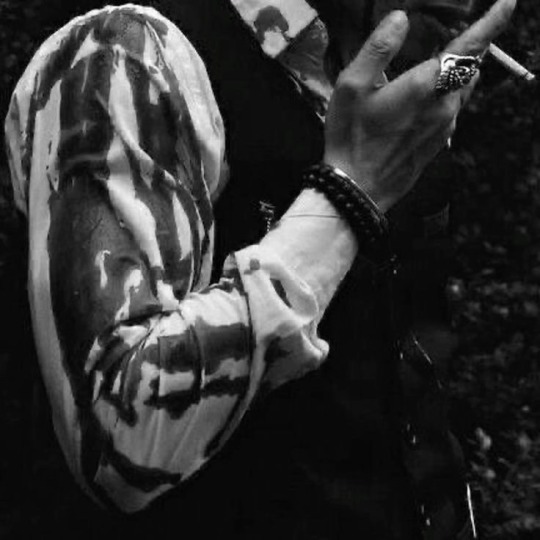
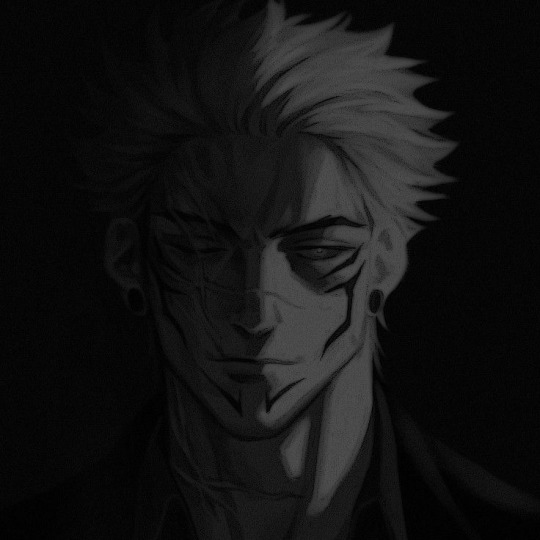

*art creds for sukuna image goes to @.maru6 here on tumblr

Nothing in this life comes for free.
Your father taught you from a very early age to never take handouts from anyone because they’ll always benefit the other person more. He was an immigrant to Japan, and he worked hard for every yen he made.
He instilled that same work ethic in you.
After being hurt on the job from working in a poor environment, your father became very ill. He couldn’t move around as much. Sitting up out of bed made him feel winded. He slowly withered away into a shell of the man who once raised you.
Your mom was long gone. She couldn’t help out, nor did she even want to.
All you were left with was a pile of debt and utter rage. Had your father not been taken advantage of by greedy corporate conglomerates, he would still be here today.
It inspired you to want to go to law school. Your dad should’ve received a hefty settlement check for what he endured from his workplace conditions. The money wouldn’t have solved everything, but it would’ve alleviated some of the stress your dad dealt with in his final days.
You’ll never forget how hoarse his voice sounded while he was on the phone with different agencies, trying to sue that place who forced him into an early grave.
You’ll never forgive them for stealing your dad away.
If you were more ambitious, you’d work to try to change the system entirely, but you knew that wasn’t your fight to face. You wanted to help the already disadvantaged families who were facing injustices beyond their control.
So, you started law school. You were smart enough for it. You had the heart. You just didn’t have a special last name to fund your college tuition. You were a first generation Japanese American in the family. While both your parents were born in America, you were born in Japan, but you were still an outsider.
You were never properly indoctrinated in the culture. Sure, you knew the basics. You knew proper etiquette and appropriate behaviors to live in Japan, but you didn’t understand the layers of how society operated. It was as if you were never assimilated into society as a Japanese citizen.
Your dad wasn’t born here, so he never could explain to you how your last name means everything in this town.
Despite it all, you’d become a lawyer even if you had to bury yourself into debt to do it. You’d work to put yourself through college. You’d do it and bear a smile on your face because you don’t take fucking handouts.
That lead you to becoming a bottle girl at one of the most exclusive clubs in the entertainment district: Malevolent Mass.
The manager said you had the right look, whatever that means. It didn’t matter. He hired you on the spot despite your lack of a substantial last name.
This would be fine. You’d work at night on the weekends and put yourself through school during the day, and you’d keep it a secret from your school, knowing you could lose your position in the prestigious school.
It was a perfect plan, right?
Yes, it was perfect.
Customers seemed to love your polite attitude and warm hospitality. You had quickly made a name for yourself in the few short nights you had worked there.
It was only your second weekend, and your section was full. It was almost comprised entirely of men and their gold digger wives, but you got use to the sexual comments and predatory smiles.
The environment was heavily secured. When you were hired, the managers made sure to show you where security was posted up at every dark corner. They also showed you where cameras were located and assured you that not anyone could just walk into Malevolent Mass.
However, you were well aware that the most dangerous people often worse suits and golden Rolex’s.
It was a busy Friday night. You had already shotgunned two 5 Hour Energy drinks, and you had been steadily sipping on a Monster throughout your shift. You had been in classes all day, and you were scheduled to work until close at 4am.
“Cherry, can we get another round of champagnes?” a sleazy voice pipes up, calling you by your codename. The club was so security driven that they gave all the bottle girls codenames to protect their identities.
“Yes sir,” you respond with an entirely fake bright smile. Your buzzed customers couldn’t tell the difference especially with the low lighting and bass boosted music.
As you walked over towards the bar, your eyes fall onto another table. A man was leaned back with his hands behind his head. He looked entirely relaxed as a girl was bent over your lap.
A crease formed between your eyebrows. They couldn’t be serious, right? Malevolent Mass had a whole downstairs portion dedicated to public sexual acts and other deviant kinks. Why the fuck were they doing that in the normal club area?
As you took a step further, ready to confront them, you realized that the girl was positioned oddly. She wasn’t angled towards his crotch, instead she was hovering over his thigh.
That’s when you noticed she had a rolled up 10,000 yen note, and she was snorting a white powdery substance off the man’s thigh.
Holy fuck, you were in over your head.
Stumbling back towards the bar, you felt your head start to spin a little. It was probably due to fact you’d only consumed energy drinks in the past 12 hours.
“Girl. You don’t look too good,” the bartender, Yorozu, said as she guided you to take a seat. “Are you okay?” she asked cautiously. Compared to the other bottle girls and dancers, Yorozu was the closest thing you had to a friend in this establishment.
“I’m fine,” you quietly replied, shaking your head. It was just drugs. You needed to take a chill pill. It’s not like people go to clubs like this just for some liquid courage.
Yorozu put a glass of water in front of you anyways, not quite believing your words. “Here. I promise you get used to it all,” she offered with a kind smile.
You gave her an appreciative smile as you took a sip of the water. Your hand was trembling, and you realized you had been sweating.
The water felt nice, and you inwardly warded off energy drinks for the rest of the night. It wasn’t worth feeling like a panicky mess.
“I need another bottle of Dom Prignon for booth 12,” you said as you looked back up towards Yorozu. She nodded and walked towards the back to retrieve the bottle of too expensive champagne.
While she was gone, you took a deep breath and looked around towards the security posts. It felt like a small safety blanket in a place like this. Finishing your glass of water, you felt infinitely better as she returned with the bottle.
“Here you are! Let me know if you need anything else, and seriously, don’t feel bad for reacting that way. It’s a bit of a culture shock for everyone during their first few nights,” she assured you as she handed you the bottle.
“Thanks, I appreciate you,” you replied with a genuine smile. Yorozu had a nice energy to her like you felt like you could get close to her one day. A girl friend would be nice to have in a place like this.
As you walked back over to your section, your lips curled into a frown as empty seats filled your eyes. Had they gotten tired of waiting and abandoned your section?
You felt disappointed as you looked around for your customers. They were nowhere to be found, but one silhouette remained in the very back corner.
“Did you bring that bottle for me? How sweet. Too bad I don’t drink,” a deep gravely voice spoke up with a hint of condescension and pure predatory prowess.
You hesitate as it feels like the air in the club shifts simply from this man’s presence alone.
“You don’t drink..?” your voice is uneasy. You feel off balance while interacting with the man tucked away in a dark corner.
“No,” the stranger replied, and he leaned forward a bit, propping his elbows on his knees as his eyes were staring straight at you. “Don’t be shy, girl. Come closer. I won’t bite…” the condescension in his voice tells you otherwise.
You swallow thickly before slowly taking a few steps closer. As you approached him, you were able to see him in all of his glory. The breath is completely sucked from your lungs as you’re able to finally get a good look at him.
He wore a white button-up top with black slacks that really didn’t leave much for the imagination. His sleeves weee rolled up to his elbows, showing off tattoos on his arms.
His face was hauntingly alluring. His tattoos also went up to his face. He had intricate lines under his cheeks that stretched down to his chin. His hair was a natural light rosy color that was pushed up from his forehead. It looked effortless and messy, unlike most business men who rely way too heavily on hair gel.
His eyes were a soft crimson color that looked like blood that had been spilled. A jarring scar slashed over his left eye, but it wasn’t ugly by any means. No, this man held a god-like status when it came to looks. However, his energy felt nothing short of daunting and corrupt.
“Who comes to a club to not drink?” you ask nervously, having to fill the eerie silence with something. It felt like you were suffocating in this man’s presence.
A rugged chuckle leaves his lips, and he tilts his head back slightly. It feels like his laugh sticks to you, making you relax and tense back up all at the same time. You can feel every yen he’s worth with each chuckle.
“If you must know, I come here for a… different sort of entertainment,” he says as his lips curled into a smirk. His eyes unabashedly roam your body — twice before he meets your gaze again.
“Oh, that’s downstairs,” you reply as you feel relieved. This man was just in the wrong section. Surely, you’d guide him to where he needed to go, and you’d be free from whatever kind of verbal hostage situation this was.
“I’m content with where I’m at,” he says with a sort of finality that leaves little room for argument. “Come closer, doll.”
His arm props up on the back of the curved booth, and his legs part into that sort of manspread position where he takes up a good portion of the booth with his massive size.
“I-“
The man pulls a clip of money from his suit, and he makes a show out of flipping through the money before he lays six 10,000 yen notes on the table.
What the hell.
“60,000 yen for you to shut up and come closer,” he says in a voice that lacks the faux kindness he was putting on earlier.
Every survival instinct in your body was telling you to run, but your brain was telling you that 60,000 yen was enough to cover your student housing and for a train pass for a month.
You slowly inch closer, your heels not even lifting from the ground.
The man gives you an amused look as he raises an eyebrow at you. “How much for you to sit on my lap?”
“I-I’m not a dancer..” you reply sheepishly, wondering if he thought you were one of the performers for the club.
“Good thing I’m not asking you to dance, doll. I’m asking you to sit in my lap,” His lips curl into a feline grin. He’s enjoying toying with you like this. “So, I’ll ask only one more time. How much?”
Your heart is pounding against the confines of your ribcage. It felt like you had a little angel on your shoulder telling you that selling this man your time will only further escalate, but the little devil on your other shoulder was telling you to milk him for whatever he was willing to give.
You stayed silent for a few minutes, calculating what a whole month’s expenses would cost you along with the 60,000 yen you already made.
“90,000 yen,” you sheepishly murmur, bracing yourself for him to yell at you for even suggesting such a high number.
There was a beat of silence before the sound of more money being unfolded was heard. He chuckled as he placed down nine more 10,000 yen notes.
“Look at you being all cute while asking for money from me,” he teased, resting his back against the back of the booth. His hand patted his thigh, signaling for you to take a seat.
“I’m not asking— You offered!” you protested, feeling a bit defensive that he would suggest that you just asked him for money.
“Don’t take such a whiny tone with me, doll. I’m only teasing you,” he says as he gestures to his lap yet again. “Sit.”
You bite your bottom lip as you look down towards his lap. You were really about to sit on this stranger’s lap for money… If your dad could see you now, he’d probably disown you.
Good thing he isn’t here.
You slowly walked over towards him, and you carefully take a seat on one of his thighs, planting your feet firmly on the ground so you’re slightly hovering. You need to be able to get away from him at a moment’s notice.
A strong hand slowly snaked up your back, towards your hair, and you tensed up quickly. The stranger wrapped his hand around the back of your neck.
“If I have to tell you again, I’m taking back my money. Sit,” he viciously growled in your ear.
You were already this far in. You should see this through. This club is safe. You were sure of it.
As you slowly allowed yourself to prop your full weight across his lap, your eyes scan around the club, looking at the security points. None of the men would even glance in your direction as if they were purposefully ignoring your section.
What did you just get yourself into?
“See? Was that so hard?” he taunted as his hand slowly dropped down to clasp around your hip. “Why is an angel like you in a club like this?”
Everything in you told you not to answer that question. As soon as he knew your weakness, he’d definitely use it to his advantage, but he probably already knew money was a good motivator for you.
“I didn’t know there was a no angel policy,” you say, trying to remain casual as you flash him a small smile.
A deep chuckle erupts from his chest. He appreciates you trying to use humor to deflect. Clever girl.
“I suppose you’re right,” he rolls his head to the side, cracking his neck from both sides. The sound of bones popping causes a shudder to go through your body. This man was good at giving a false sense of security. “But angels don’t last long in a place like this. It would be a pity to see you be ruined.”
His other hand firmly rested against your thigh, right above your knee. He gives your leg a light squeeze. “Tell me your name, doll.”
“Cherry,” You respond without missing a beat, giving your code name instead of your real name.
“You don’t know who I am, do you?” he asks, allowing his fingertips to glide against the exposed skin of your thigh. Your breath picks up in speed, noticing he’s getting more bold with touching you.
“Am I suppose to?” you ask, genuinely curious if this man was some big shot that you were suppose to know.
You very rarely kept up with politics, only knowing major crime names from your law classes, and you definitely didn’t keep up with conglomerates. This man wouldn’t be the first millionaire to walk through the doors of Malevolent Mass, and he wouldn’t be the last.
Another deep raspy chuckle escapes him. “No, I actually find it quite cute you don’t know who you’re dealing with.”
His hand slithered up your back once again, and this time he grabbed a fistful of your head, tugging your head back to look up at him. A gasp slips past your lips as your eyes meet his crimson ones.
“Tell me a secret, cherry,” he hisses your codename like it’s disgraceful on his tongue. “Do you belong here?”
You think to try to get up from his lap, but his other arm has worked to secure you to him tightly. The security men aren’t even glancing in your direction. No one would hear you over the music blasting if you tried to scream, and if this man was as important as his inflated ego suggested, no one would likely even help you.
You’ve done everything thus far to get out from underneath the rich man’s thumb, but it feels like every time you take one step forward, something pushed two steps back.
Do you belong anywhere? No where feels like home after your dad passed. Tears stung into your eyes. Why were you thinking of him at a time like this? He can’t save you now.
The man’s lips twitched into a smirk as he saw the tears building in your eyes. That alone was confirmation enough. You didn’t belong here at all.
His other hand reaches up to your face, and he gently strokes your cheek — a contrast to how tightly he was holding your hair. “Such a pretty crier,” he deep gravely voice coos to you.
You can’t even help it at this point. You try to blink the water away from your eyes, but the tears slip down your cheeks anyway. You just silently cursed yourself for ruining your own makeup.
“You’re a crybaby, aren’t you?” he asked as his fingers brush against your pouty lips, and he grabs your chin carefully. “Open.”
Accepting defeat, your lips part ever so slightly for him, and you can feel the way his heart races in his chest from the sight. He narrowly eyes you as two of his fingers slip past your lips.
You’re momentarily stunned from his thick fingers filling your mouth. You feel a thrum between your thighs, but you try to ignore it. Surely, your body was just betraying you, and his body was betraying him. You were able to feel every inch of his hard on through his slacks. The sight of your tears only served to spur him on further.
When you give his fingers a light suckle, he purrs a praise for you. Leisurely, he thrusts his digits in and out from your mouth. He admires the way you accept them in without a single complaint.
“Such a good girl for me. Try a little harder,” his voice darkly instructs you as he slides his fingers deeper past your tongue, hitting your inexperienced throat.
Your throat involuntarily constricts, causing you to gag and cry more. You hum around his fingers as you whimper. He merely laughs at your pitiful display.
“We’ll have to train your cute little throat to take more, won’t we?” he asked, making a dull ache settle in your lower stomach. You had never done anything like this, and the way he was treating all this so casually filled you with some sort of… excitement.
His words also struck you with fear as you realized this meant he was likely far from being done with his antics.
His fingers continue until you’ve coated them in a thin sheen of saliva. When he pulled from you, you were panting even though he hadn’t taken away your ability to breathe.
He smirked as he gazed at you as if he can tell that your cunt is clenching around nothing right now. It’s like he knows every perverse desire you’ve fantasized about in your alone time.
“You’re a vision, doll. I’m going to have so much fun breaking you,”
Before you could even think to inquire what he meant by that, an unfamiliar male voice spoke up to your side, causing you to flinch slightly. The other man was dressed in basic business attire, but he had a scrappier look to him.
“Sir?”
The stranger tensed, and you could practically see all the playful taunting energy in his face melt away. He stared daggers into the newcomer’s soul. “Speak.”
“Members of the Gojo clan were spotted near Dante’s 7th circle,”
“Dammit, what a pest,” the pink-haired male growled. He clearly didn’t fancy being interrupted.
You perked up a little from the mention of the infamous Gojo clan. You had heard plenty of whispers about the clan fluttering about on campus, and the clan had been brought up momentarily in your organized gangs class before the professor quickly shut down the conversation.
Yakuza clans were talked about in school, but the professors were very careful about what they chose to say, knowing that members were everywhere amongst them.
The stranger carefully moved you from his lap, and he stood up, gathering himself before turning to you. “You behave. I have to go tend to something, but I’ll be back for you,” he said as he reached into his coat, and he casually tossed a whole clip of yen onto the table.
Your eyes widened at the stack of money sitting on the table, and your heart began to race. It felt like the last two hours had been a complete blur, but now, you were face with a thick stack of money — probably enough to cover you for at least three months… and you weren’t even done with your shift yet.
Your excitement was quickly overshadowed by fear. He was coming back for you. How intertwined had you gotten yourself into this mess?

taglist: @theuniversesnepobaby
#jjk#jujutsu kaisen#jjk fanfic#fanfic#jjk suggestive#jjk gojo#jjk sukuna#sukuna x you#jujutsu sukuna#sukuna ryomen smut#sukuna ryomen#ryomen sukuna#yakuza!sukuna#sukuna x reader#sukuna#ryomen x reader#jjk ryomen#jjk x reader#jjk x y/n#jjk fic#jjk dead dove#jjk x you#sukuna smut
2K notes
·
View notes
Text
#Us injustice system#Death penalty#@ my American wife who was bemoaning lack of capital punishment here in Australia#Deeply flawed system
1 note
·
View note
Text
Even if you believe in the death penalty, this is just plain awful. Sign this petition to stop this horrible idea from coming to fruition:
and this one against this specific execution:
#death penalty#petitions#american penal system#bad ideas#terrible idea#clemency#against the death penalty#alabama#injustice#miscarriage of justice
1 note
·
View note
Text
something i've been thinking about. everything that is happening now in america is happening in the system the founding fathers made. it may have not always gone this exact path but something like this was always coming. people act like you can so easily separate the philosophy of "all men are created equal" from slave ownership and wives as property and colonialism. but you can't. because the fact that they made all these grand statements and checks and balances AND carved out loopholes to maintain profitable injustice is the fucking point. it's all the fucking point. the purpose of a system is what it does. you cannot have a just society when your entire conception of justice and liberty and virtue relies on making exceptions for whatever injustices are valuable to you. it's virtue as a pretense and that cannot be sustained forever. what's happening is not un-american. it's the sickness at the core eating it's way to the skin.
#m.#i cannot stop thinking about the roman empire either lol#BUT! holds yr hand. we WILL stay silly and we will stay COMPASSION DRIVEN!#i love all of you no matter what happens. every life is worth living friends even if it's a tragedy
423 notes
·
View notes
Text
the injustice of the rat grinders technically playing by the rules and getting lauded for it because they have discipline and are generally Good at School vs the bad kids literally saving the world every other day and having to play catch-up to be acknowledged for it. the way that public school only caters to people who are good at "playing the game" of the education system and anyone that can't function how the school deems you should under its strict policies and conditions is tossed aside and called a failure. how are we feeling, american public school survivors?
#as a disabled person who did well in high school only because i could see how they wanted me to respond#and then as soon as college came and you actually had to like. think and do stuff. i fell apart#i am seeing some truths that. hurt.#fhjy#d20#dimension 20#fantasy high
3K notes
·
View notes
Note
(sorry in advance, I've been stewing over this for so long that this will be a long one xd)
I was re-reading your fics on ao3 again (sue me, im starved for desmond time travel content) and whilst reading Eagle of Alamut's description i realised '...wait a damn minute, it is true! all of Desmond's knowledge on past is from his ancestors!' (not everyone is as big of a nerd as shaun). Cue weeks of relentless daydreaming over Desmond in Reneisance Italy trying his damnest to lay low... but: 1) he does not know what is socially acceptable at the time (clothe and behaviour wise)
2) the animus likely shielded it's users from the more... er.. unsaviory historical accuracy (child marriage, smell, violence and mistreatment towards the poor, women, disabled)
3) politics, culinary arts, medicine and money value from that era are not common knowledge (or even fully known to todays historians)
4) Ezio was not known for his subtility...
...so while desmond may know who to strike in order to protect Ezios family from getting executed, what places he may know to avoid if he wants to avoid attention from the italian brotherhood.
He does not know what he was getting himself in to when he decided to travel back in time.
I can just imagine him thinking that he can finally retire and live his life, but then BOOM here comes the shock of sociatal injustices! religious violence! inequality! horrendous mistreatment of beggars and disabled people! and as a good man raised in the 21st century he obviously can't, in his right conciousness, just turn his back on these issues, on these people.
So here he is, in Rome of all places, doing his best to atleast stay hidden from the Auditore's, and consequesntly, the Italian brotherhood's, detection, as he stalks the bright rooftops of Roma as histories (probably) very first assasin turned vigiliante!
I can just picture him at one point or another, getting mistaken for a Spanish assasin and his only attempt at 'confirming' (read: encouraging misleading rumours), is to use the very little languistic knowledge the American education system has bestowed upon him. cue him very awkwardly trying to immitate a Spanish accent/ speak in Spanish. or just, you know, say the only words every student knows, 'Feliz Navidad'.
It would be so funny if Desmond’s Spanish are based on:
1) what little remains of Ezio’s Spanish (maybe on par or even worse than his French)
2) Basic Spanish that he learned on the Farm
3) Spanish songs he heard
So people think that Desmond is eccentric.
And Rich.
Because Desmond wants to help people but he doesn’t want to be seen as an Assassin so…
He becomes a supposed rich Spanish (Arabic would have sent a red flag to the Brotherhood) noble who came to Rome to live a life away from his ‘family’.
Why is he ‘rich’?
Well, killing nobles and other ‘evil doers’ will flag the Brotherhood as well so it would be better to just…
Leave certain incriminating evidence in the doors of their enemies and let them duke it out. Hey, if some things go missing while they’re too busy with their enemies, that’s just collateral damage.
Also…
Sometimes, things go missing when some people get into accidents.
It’s easy to buy the impoverish area in Rome. It’s a bit challenging to get doctors to treat them.
Until Desmond flashed the right amount of money, of course.
Desmond manages to stay under the radar by being part of the upper echelon.
An eccentric foreigner who helps the poor and sick out of the goodness of his heart.
Or… because he apparently believes that the way to heaven is through good will and not… paying the clergy.
Desmond knows that being seen as completely good is a bad thing as well so he lets rumors spread that he’s an opportunist who heals the sick and protects the weak to receive their loyalty. He gives them salary to become his guards (not that he needs any) and people whisper how loyal the poor are to someone who gives them bread.
And to hammer in that “no, Ezio, I am absolutely not connected to the Templars BUT I’m also not going to be a good ally, just leave me alone!” plan he has, he becomes a patron of the art.
Sexually progressive art.
The church hates him but tolerates him because Desmond does ‘donate’ (jokes on them, he donates what he stole from the church) and the artists love him because he commissions stuff with the same thing over and over again “whatever you want to paint/sculpt/work on but I want the Borgia men getting fucked in the ass while Lucrezia Borgia watches”
He’s not rich enough to actually be a threat (especially after Ezio starts wrecking shit up) and he keeps to himself most of the time.
But, of course, life always has it out for Desmond and he comes face to face with a wounded recruit at the edge of his property and…
Well…
He only wanted to heal him then send him on his merry way.
He didn’t expect Ezio to come barging in thinking said recruit has been kidnapped by the eccentric ‘possibly sexual deviant’ Lord Miles.
#assassin's creed#desmond miles#ezio auditore#ask and answer#teecup writes/has a plot#fic idea: assassin's creed
263 notes
·
View notes
Text
“Any individual person who is from a minority could achieve high status by their own merit but any actual such individual is just a DEI hire, but because they could (though they didn’t), the system is fair. Any attempt to correct for historical injustice is thus racism against the majority, who are now more oppressed than minorities ever were.” <- literally something American conservatives have been arguing since a few years after the Civil War. Andrew Johnson was complaining about anti-white discrimination before Reconstruction was even over!
155 notes
·
View notes